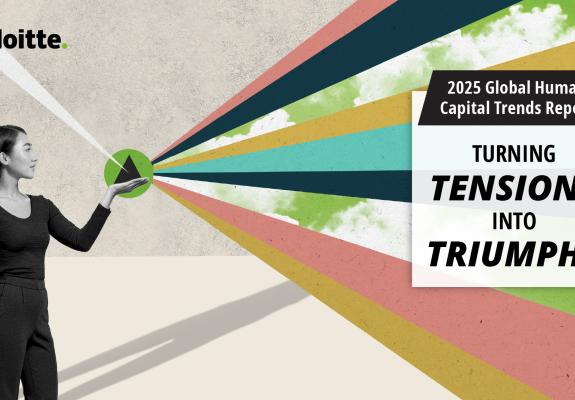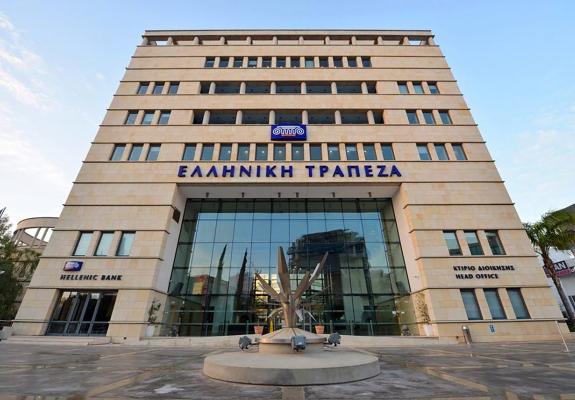Deloitte’s 2025 Global Human Capital Trends aims to help leaders navigate complex workplace tensions
Nearly 10,000 business and human resources leaders from 93 countries across industries and sectors participated in this survey, focused on balancing short-term results versus long-term value.
Deloitte’s 2025 Global Human Capital Trends, Turning tensions into triumphs: Helping leaders transform uncertainty into opportunity, explores how workers, managers, executives and organisations are navigating today’s biggest workplace challenges. It shows how organisations can rethink talent development beyond traditional experience pathways, reimagine the role of managers, and use Artificial Intelligence (AI) to create value for organisations and their people.
Key findings
- Two out of three (66%) managers and executives say that most recent hires are not fully prepared, and a lack of experience is their most common failing.
- Almost three out of four (73%) of organisations recognise the importance of reinventing the role of the manager, but just 7% are making great progress.
- More than half (54%) of workers and leaders are concerned about the blurred distinctions between work done by humans and technology.
Deloitte’s report finds that the new reality is creating worker, manager and organisational needs that are seemingly at odds — bridging the growing experience gap as entry-level roles disappear, supporting people and their development as middle management evolves, and ensuring that workers and organisations are able to fully realise AI’s potential.
“Workforces as a whole, rather than people as individuals, have long been at the centre of most workplace strategies. But when we look more closely at each worker’s skills, tasks, motivations and well-being, we can better incentivise them to stay longer and think more creatively about how their organisation can succeed”, says Simona Spelman, US Human Capital National Leader and Principal at Deloitte Consulting LLP.
Closing the experience gap
Organisations are confronted by a growing tension between the need for experienced workers and the reality that many skilled candidates lack the necessary experience. Complicating matters is the shrinking number of traditional entry-level roles, making it harder for workers to gain the necessary hands-on experience.
To close this gap, organisations should shift from rigid experience requirements to skills- and potential-based hiring. To close experience gaps, 73% of executives and 72% of workers agreed that organisations should do more to connect their workforce with opportunities to build experience. At the same time, 74% of surveyed workers, managers and executives say it is very, or of critical importance to prioritise human capabilities.
The evolving role of managers
To help organisations and workers navigate rapid change and increasing AI adoption, the traditional role of managers is ready for reinvention. Many managers today find themselves focused more on administrative work than nurturing talent, and AI can help them balance their daily tasks so they can become more people-focused and agile. The survey showed that managers spend nearly 40% of their time on solving problems for today and administrative tasks, with only 13% of their time spent developing the people who work for them.
At the same time, 36% of managers said they are insufficiently prepared to be people managers, and 40% report a decline in mental health after becoming managers.
Organisations that successfully reimagine the role of the manager will likely be better positioned to navigate an increasingly complex and AI-powered future. Charis Kourtelli, Director in the Human Capital team at Deloitte Cyprus, explains: “Organisations are increasingly eliminating or reducing middle management roles to enhance efficiency, agility, and worker empowerment, driven by economic pressures and the rise of AI. Despite this trend, managers play crucial roles in coaching, developing, and motivating employees, redesigning work for AI collaboration, and enabling strategic problem-solving and innovation. Reinventing the manager role is essential to adapt to the new world of work. Organisations should support managers by leveraging AI for real-time insights, democratising process redesign, and empowering decision-making. Developing managers' judgment skills is key to navigating complex and volatile work environments to drive better human and business outcomes”.
An employee value proposition in an AI-driven era
As workers increasingly use AI, it’s changing their experience at work in unexpected and subtle ways. Human/AI collaboration is an increasingly important part of the modern employee value proposition (EVP), which encompasses the reasons people choose to work for and stay at an organisation. An updated EVP can help organisations better support their employees and adapt to these changes. Over 70% of managers and workers are more likely to join and stay if its EVP helps them thrive in an AI-driven world.
Additionally, leaders who communicate AI’s role in job transformation, career growth, and work-life balance can help create workforce trust, with 52% of leaders saying that they view the potential value of deeper human and machine collaboration as very or critically important.
To view the full report, visit Deloitte's 2025 Global Human Capital Trends page: https://deloi.tt/4bw2RtI
Research Methodology
The research surveyed nearly 10,000 business and human resources leaders across many industries and sectors in 93 countries. In addition to the broad, global survey that provides the foundational data for the Global Human Capital Trends report, the research was supplemented this year with worker, manager, and executive-specific surveys to uncover where there may be gaps between leader and manager perception and worker realities. The survey data is complemented by more than 25 interviews with executives from some of today’s leading organisations.






